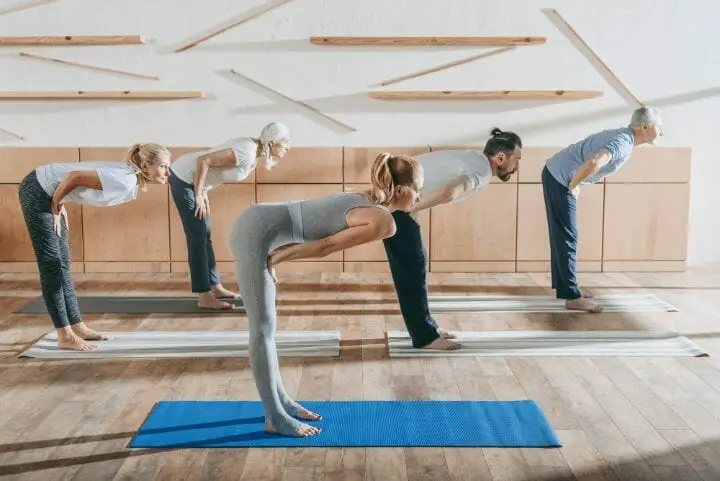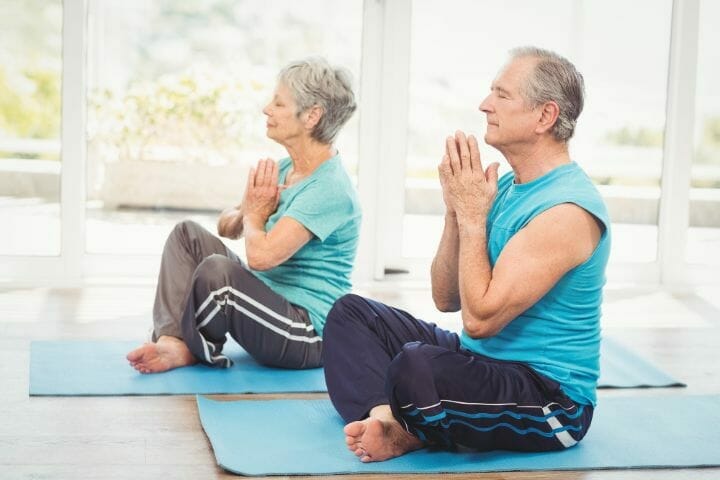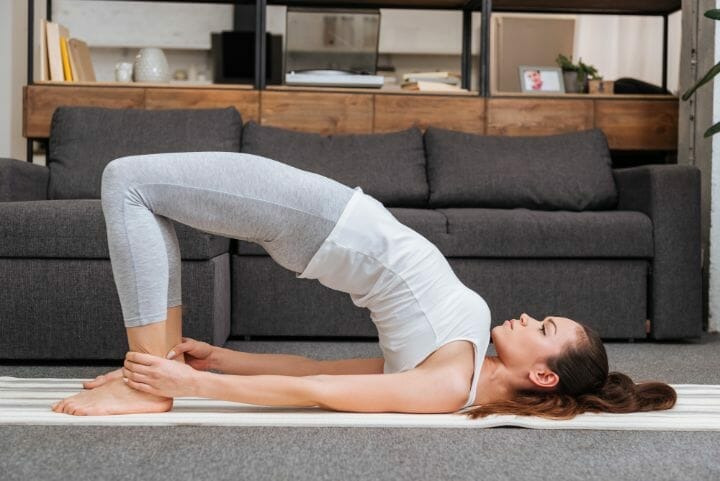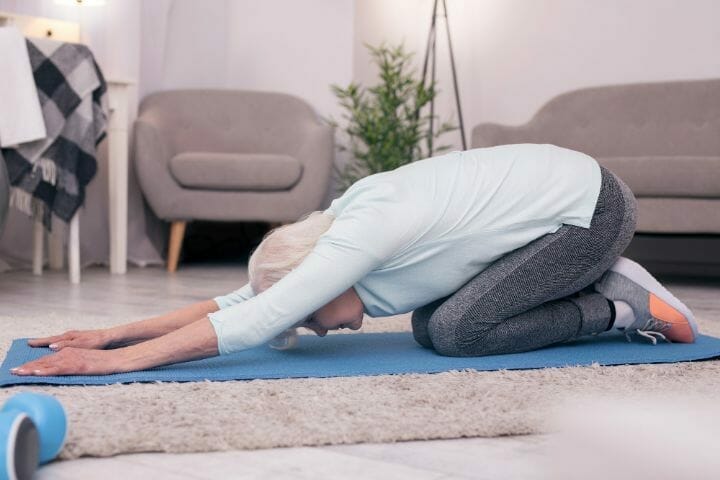A strength-based routine is beneficial for preventing loss of for people with conditions like and osteoporosis.
Our bodies grow naturally till the age of 25 years, though this process can be made more efficient with the help of a good regime and balanced nutritional intake. But, in a person with osteoporosis, the natural pace at which cells are produced faster than the rate of is disrupted.
This leaves the person suffering from this disease with later in life. In severe cases of osteoporosis, l may arise at an early stage and could result in the risk of a .
that works on your strength is also a proven method to reduce the scenarios of . Isometric exercises for osteoporosis are especially effective at strengthening the neck, back, upper, and lower extremities, and are capable of enhancing bone formation.
Yoga may also be an effective treatment for osteoporosis. Certain studies have found that practicing yoga for as little as eight to ten minutes daily can increase bone density.
Contents
Is Yoga Good for Osteoporosis and O
ular part of their training.
When you perform a , you are engaging different groups at work in different directions. This creates tension in the body, stimulating the cells called osteoblasts, which form new bone formation
moves your groups in a way that they work against each other. These movements yield benefits that are similar to those created by weight-bearing exercises. that involve a or a pose work the best to promote
exercises increase balance and flexibility; this is a huge advantage for people with osteoporosis as they are at a higher risk of hip fracture or . A person with low bone mineral density cannot risk an osteoporotic fracture by taking a fall. Increased balance and flexibility would mean that the person would be less prone to tripping and falling.
Group experiment reports of DEXA scans reveal that when osteoporotic and osteopenic patients practiced gained when compared to the patients under prescription medication alone.
Now, since we have given you an account of how effective can be in preventing and treating issues, let us explore some asanas that are most suited to mitigate .
Word of Caution: Before performing any of the exercises mentioned here, you must consult a , or as they are in a better position to guide people with various health complications.
We also recommend that you get a before diving into complex to understand the state of your skeletal health. It also helps you avoid any complications that may arise as a consequence of your . Yoga practice includes movements involving a if you have severe osteoporosis and we urge you to be extra cautious.
Once your or doctor clears you to practice light to medium intensity , you can start performing the in a sequence.
You may also like Best Supplements for Osteoporosis
Yoga Poses for Osteoporosis
Tree Pose
- Begin standing straight and then bending your right knee as the first movement.
- You follow this by rotating the same knee outside while keeping the pelvis stable.
- Now, lift your right foot so that it touches and rests on your . Complete the pose by folding your hands in front of your chest.
- Regularly practicing the tree pose does wonder in fixing , strength, and single- balance.
Extended Triangle Pose
- Start with a wide-leg stance.
- Rotate your left foot and knee outside that it makes an apparent right angle, aligned with the direction of your right knee.
- Now, bring both your arms up to make a T-shape with your neck and extend your torso downwards to the .
- Try to touch your left shin with your left hand while keeping your right hand stretched upwards.
- As you progress, try to go lower.
This pose will work on your sideward and train your body to prevent any due to hyperextension.
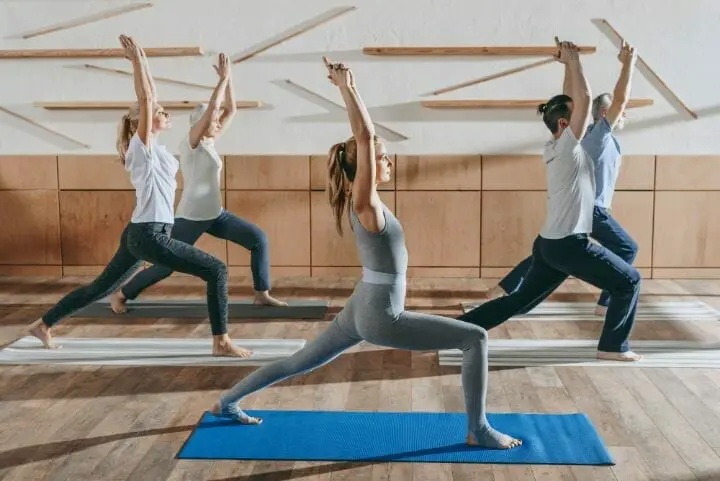
You may also like Does Smoking Cause Osteoporosis?
Warrior Pose II
- Stand in a wide stance and rotate your left foot and knee outside, just like the extended triangle pose.
- Now bend your left knee in a way that doesn’t surpass your heel.
- Once you make a 90-degree angle with your at the knee, look in the direction of your left knee and raise both your arms straight at your shoulder level.
Extended Side Angle Pose
- Begin this from ‘Warrior Pose II’ and extend your torso to rest your left arm on your left knee.
- Now, extend your right arm and take it over your right ear.
- End the pose by extending out your right heel with the help of your toes.
Locust Pose
- This is a extension that you begin by laying chest flat with arms along your torso.
- Lift your chest off the ground along with your legs stretched out. Do not strain your body and bring your arms up in the air along your torso.
- This move targets the lumbar as well as the and prevents due to hyperextension and other types of vertebral fractures.
You may also like Does Osteoporosis Affect Teeth and Nails?
Bridge Pose
Another that is excellent for is the ‘Bridge Pose’.
- To perform this move, lie down on your back with your knees bent. Follow this by pressing your feet into the ground and lifting your hips and torso off the ground.
- Now extend both your arms and join them by interlinking them under your body bridge.
- Ease into the final position by rotating your shoulders backward.
- This is one of the more challenging as it puts not only your lumbar and but your whole body under tension.
You can club this move with other types of workouts as well as it is an excellent way to strengthen your body and stimulate .
Corpse Pose
This pose is usually done at the end of any workout or sequence and is meant to relax your body and its systems.
- Lie down on your back and keep your legs hip-width apart and extend by stretching your toes away from the body.
- Keep your shoulder blades touched to the ground and spread your arms by your torso.
This plan covers almost all the muscles and joints of the body and will provide a full-body workout to tackle osteoporosis. You can do them on your own but it is better that you join a to receive expert supervision.
The mentioned above are suited to boost isometric strength and . These are part of Loren Fishman , a much-studied and scientifically proven for osteoporosis.
You may also like Can You Die from Osteoporosis?
Loren Fishman for Osteoporosis: A Study
Loren Fishman is a physician who constantly incorporates along with his medical practice to treat his patients. His endeavor to put as a treatment method for people with began when he was cautioned against using asanas on either osteoporotic or osteopenic patients.
Loren Fishman, along with the help of a few friends, made a DVD workout video called “ For Osteoporosis”. The poses he chose are focused on parts of the body most sensitive to the , hips, femur, and wrists. He believed that in these parts of the body will reduce or even eliminate the possibility of .
Loren Fishman put in two to four years of work for collecting data about practitioners’ blood tests, , etc, which were used to conclude that not only put a pause on the loss of but in many cases reversed it.
Loren Fishman’s Yoga for Osteoporosis was a path-breaking study in the field of osteoporosis, , treatment, and the medicinal benefits of . He found that under a specialized can work wonders to fix the issues of and the apparent risk of .
Frequently Asked Questions
Can Everybody with Osteoporosis/Osteopenia Perform Yoga?
If you are suffering from severe osteoporosis, we advise you to consult a or an appropriately qualified reports and present these to the therapist for recommendations before starting the .
What Yoga Poses Are Most Suited for Those with Osteoporosis?
Osteoporosis sufferers should make neutral-spine poses like the Mountain pose the crux of their practice. Start by aligning the spine optimally in these poses.
You may also like How Does Estrogen Affect Osteoporosis?
Points to Consider:
– You can perform any asana and hold postures that strengthen the in the legs, arms, and abdominal region.
– Avoid postures that involve complete arching of the back, like Chakrasana. Likewise, advanced or a can cause compression fractures. The ‘Locust’ and ‘Bridge’ poses mentioned above should also be performed only if cleared by your . You can do the modified versions of these asanas which do not place unwanted stress on the body.
– The initial focus of the therapy should revolve around slow progression, aligning breath, flexibility, and gaining balance. Progressing too fast could lead to in people with structures. A in the lumber or the could even prove to be life-threatening for old age patients.
– You can practice ‘‘ to fully benefit from the calming, yet strengthening aspect of . Yin Yoga encourages you to hold the
Conclusion
is as good as any other if you are looking to increase and . Yoga and an osteoporosis diet plan can greatly reduce the painful effects of osteoporosis.
The amount of information available online is overwhelming and can prove to be risky without the guidance of a qualified professional. A compression fracture or a wrist fracture is not something that people with rheumatoid arthritis, osteoarthritis, and osteoporosis can easily recover from, so we insist that you get in touch with a yoga teacher who is experienced in guiding people with similar bone conditions.

